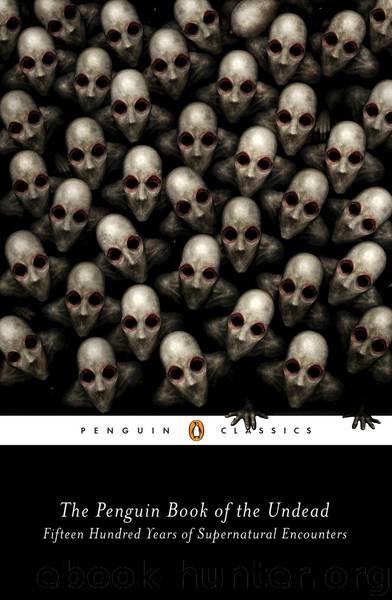Penguin Book of the Undead, The by Bruce Scott G. (Ed.)

Author:Bruce, Scott G. (Ed.) [Bruce, Scott G. (Ed.)]
Language: eng
Format: epub
Tags: Horror, Fantasy, History, Supernatural
Publisher: Penguin
Published: 2016-09-09T13:08:44+00:00
AN ARMY WHITE AS SNOW1
In the middle of the twelfth century, a story attributed to Abbot Maiolus of Cluny (d. 994) concerning the appearance of an army of dead souls during a war between two dukes illustrated vividly the benefits for elite laymen of offering suffrages for the dead. Eusebius of Sardinia was a pious nobleman who had given over the revenues of an entire city to offer continuous alms for the poor and masses for the faithful departed. When his rival, Ostorgius of Sicily, took control of this city by force, God sent a vanguard of souls, “an army white as snow,” who had been liberated from purgatorial suffering to win it back for Eusebius’s holy purpose. Around 1150, a Cluniac monk told the story of the two dukes in the form of a long poem suitable for monastic rumination, amplifying its themes to create a dramatized lesson on the duties and rewards of knightly piety, but the story circulated most widely in the decades around 1200 as an exemplum, a pithy moral tale intended for religious instruction that may have been redacted for use in sermons to laypeople.
Concerning two dukes who warred against each other and were brought to terms of peace through a wondrous vision of souls.
I will tell you, my brothers, of an event involving two men that occurred in recent times, one that I heard about through a trustworthy and reliable report. It is a story to teach us the virtue of giving alms and inspire us never to tire of doing so. For alms not only benefit those who are still physically alive by securing forgiveness for their sins; rather, because they obtain salvation and redemption for souls, alms also give comfort to the dead, who no longer have opportunity to repent.
There were two dukes, one of Sardinia, the other of Sicily, who opposed each other in an enduring conflict that went on now in one’s favor, now the other’s. The duke of Sardinia was called Eusebius, the duke of Sicily Ostorgius. Eusebius had the greatest zeal possible concerning the dead, doing all that he could for them by celebrating masses, bestowing alms, and paying a tithe of all his goods. Moreover, he set apart for God and for the liberation of faithful souls one of the more prosperous cities in his possession; from that city he received nothing for his own use, but instead he caused tithes from all his realm and holdings to be brought there. In that place he assembled a very great multitude of the poor and continually fed and clothed them, and there throughout the churches celebrations of the Mass took place.
Now the other man, Ostorgius, was richer and mightier than Eusebius with respect to his kingdom and army, but in virtue he was much his rival’s inferior. In all his earthly treasure, Ostorgius could not compare with him who so stored up for himself treasure in heaven; nor with his army could Ostorgius compare with him who, without
Download
This site does not store any files on its server. We only index and link to content provided by other sites. Please contact the content providers to delete copyright contents if any and email us, we'll remove relevant links or contents immediately.
Animal Frequency by Melissa Alvarez(4459)
Sigil Witchery by Laura Tempest Zakroff(4237)
Real Magic by Dean Radin PhD(4120)
Fingerprints of the Gods by Graham Hancock(3996)
Aleister Crowley: The Biography by Tobias Churton(3634)
Journeys Out of the Body by Robert Monroe(3615)
Alchemy and Alchemists by C. J. S. Thompson(3515)
The Rosicrucians by Christopher McIntosh(3510)
Mysteries by Colin Wilson(3447)
Hitler's Monsters by Eric Kurlander(3328)
The Hatha Yoga Pradipika (Translated) by Svatmarama(3326)
Wicca: a guide for the solitary practitioner by Scott Cunningham(3167)
John Dee and the Empire of Angels by Jason Louv(3163)
Infinite Energy Technologies by Finley Eversole(2974)
Book of Life by Deborah Harkness(2931)
Dark Star Rising by Gary Lachman(2865)
The Book of Lies by Aleister Crowley(2840)
Aliens by Jim Al-Khalili(2827)
To Light a Sacred Flame by Silver RavenWolf(2814)
